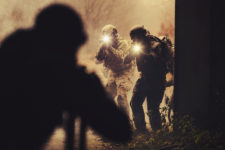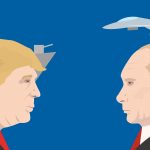Century-Old Anti-War Warning About the 1 Percent Still Rings True Today

A racket is a way of profiteering from an operation in a dishonest manner. According to Smedley D Butler, “only a small ‘inside’ group knows what” a racket’s about. It usually involves making money for the few at the expense of the many. And the most profitable racket of all is war.
This is the message the retired US Marine Corps major general toured the States explaining in the early 1930s. And his speech, War Is a Racket, was published as a small book in 1935. It warned the public that just as the profit-bearing Great War had come to pass, another global war was on its way.
The ex-military leader begins his dismantling of the myth of the war for the good of the people, by pointing out that what was then known simply as the “World War” had produced “21,000 new millionaires and billionaires” in the US, as they “turned blood into gold”.
And Butler knew a thing or two. At the time of his 1940 death, he was the most awarded US marine in history, having received an unprecedented number of medals over a 34 year career, which saw him fight in the 1898 Spanish-American War and play a leading role in the US occupation of Haiti.
Yet, reading him 85 years on, what’s obvious is despite Butler’s main argument – that war is a wealth-generating operation benefiting the rich – being widely accepted, this hasn’t brought about an end to it. Rather, the elite have become more sophisticated in their execution of such ventures.
Hand over fist
The United States joined the First World War late in the day. The war broke out in July 1914, but the US didn’t enter the fray until April 1917. And Butler puts the entry of the then isolationist nation down to the threat to its profits being faced if the Allies lost the war.
The former marine sets out that its “brief participation” cost the US $52 billion. And as he writes in the mid-1930s, Butler makes clear that this debt hasn’t been paid off as yet, although the profits it generated for businesses had long ago been banked.
As a concrete example of how the elites benefit from warfare, the military careerist points to the du Pont family – today’s transnational company Dupont – whose annual profits jumped from a pre-war $6 million to $58 million a year during the war, which was on the back of gunpowder powder sales.
And while the Dupont product came in handy, Butler points to the huge profit spikes of other industries for merchandise bought by the US government that was never used: 35 million pairs of shoes were purchased for 4 million soldiers, along with 20 million unused mosquito nets.
“Who provides the profits?” Butler goes onto ask. And speaking to an American public, he answers that it is them who pay in tax. However, that didn’t begin to take into account the very “biggest part of the bill”, which is paid by soldiers with their lives, bodies and minds.
Investing in their own demise
The former major general goes onto explain that the global elites running the wars at a distance for their own benefit, had also honed the system of war profiteering over recent years, as he recalls that at the beginning of his career, soldiers still “fought for money”.
Indeed, Butler remembers a system whereby governments paid soldiers well, at times they were provided with bonuses and even received part of the profits gained. However, by the Great War, patriotic young men and the wider population had been propagandised into accepting conscription.
“Having stuffed patriotism down their throats, it was decided to make them help pay for the war, too,” Butler continues. “So, we gave them the large salary of $30 a month.”
The military man then explained that $15 of this was sent to a soldier’s dependents, so they didn’t become a burden on society, while a further $6 was taken out of each pay cheque as a form of accident insurance. So, the soldiers were left with as little as $9 a month.
A rising foreboding
“To smash the war racket”, Butler asserts, three steps are needed: take the profit out of war, permit the youth who make up the fighters to have the deciding vote on whether to participate in a conflict, and the US must limit its military forces to defence purposes only.
Of course, none of his advice was heeded. Butler was making his case to end war as the Second World War was looming in Europe. And following that global conflict, the world has since witnessed the US take part in military build-up and actions abroad on a scale never seen before.
“Secretly each nation is studying and perfecting newer and ghastlier means of annihilating its foes wholesale,” Butler further warned a mid-1930s United States public. And he posits that future victories will be won on the “skill and ingenuity” of scientists.
And while that prediction may have foreshadowed atomic warfare, Butler didn’t live to see the bombing of Hiroshima by the US in 1945. And nor did he bear witness to further breakthroughs in modern warfare, such as the ability to kill in another region of the globe via remote control.
The drug war scam
However, Butler didn’t foresee that in the not too distant future governments would begin to declare war upon inanimate objects, such as the war on drugs and that on terror. And while both these wars don’t have a direct enemy, their profit-generating capacity has been phenomenal.
Take the war on drugs. Birthed by Richard Nixon in 1971, this intensification of the law enforcement arm of prohibition has seen vast expenditure on the policing of illicit substances and the criminal networks involved, which have only become richer and more sophisticated as the war progressed.
And besides taxpayers covering drug war interventions, it’s also the public that pays with lives and bodies: whether that be through the increased dangers involved with drugs and their use, escalating rates of imprisonment or the simple criminalisation of vast numbers over a victimless crime.







